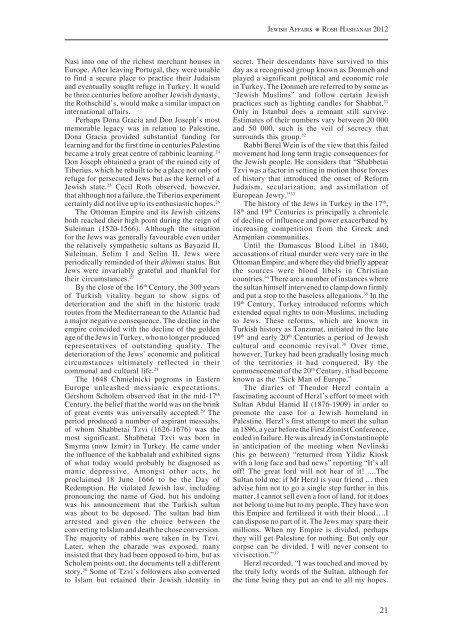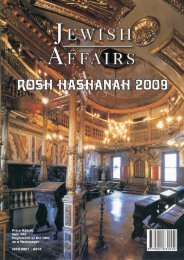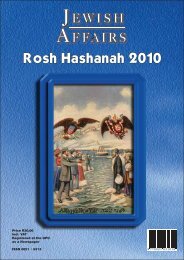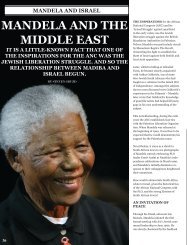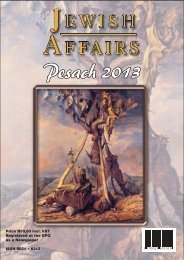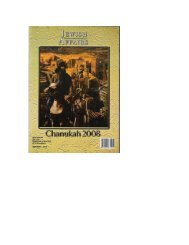Jewish Affairs - South African Jewish Board of Deputies
Jewish Affairs - South African Jewish Board of Deputies
Jewish Affairs - South African Jewish Board of Deputies
- No tags were found...
You also want an ePaper? Increase the reach of your titles
YUMPU automatically turns print PDFs into web optimized ePapers that Google loves.
JEWISH AFFAIRS ROSH HASHANAH 2012Nasi into one <strong>of</strong> the richest merchant houses inEurope. After leaving Portugal, they were unableto find a secure place to practice their Judaismand eventually sought refuge in Turkey. It wouldbe three centuries before another <strong>Jewish</strong> dynasty,the Rothschild’s, would make a similar impact oninternational affairs.Perhaps Dona Gracia and Don Joseph’s mostmemorable legacy was in relation to Palestine.Dona Gracia provided substantial funding forlearning and for the first time in centuries Palestinebecame a truly great centre <strong>of</strong> rabbinic learning. 24Don Joseph obtained a grant <strong>of</strong> the ruined city <strong>of</strong>Tiberius, which he rebuilt to be a place not only <strong>of</strong>refuge for persecuted Jews but as the kernel <strong>of</strong> a<strong>Jewish</strong> state. 25 Cecil Roth observed, however,that although not a failure, the Tiberius experimentcertainly did not live up to its enthusiastic hopes. 26The Ottoman Empire and its <strong>Jewish</strong> citizensboth reached their high point during the reign <strong>of</strong>Suleiman (1520-1566). Although the situationfor the Jews was generally favourable even underthe relatively sympathetic sultans as Bayazid II,Suleiman, Selim I and Selim II, Jews wereperiodically reminded <strong>of</strong> their dhimmi status. ButJews were invariably grateful and thankful fortheir circumstances. 27By the close <strong>of</strong> the 16 th Century, the 300 years<strong>of</strong> Turkish vitality began to show signs <strong>of</strong>deterioration and the shift in the historic traderoutes from the Mediterranean to the Atlantic hada major negative consequence. The decline in theempire coincided with the decline <strong>of</strong> the goldenage <strong>of</strong> the Jews in Turkey, who no longer producedrepresentatives <strong>of</strong> outstanding quality. Thedeterioration <strong>of</strong> the Jews’ economic and politicalcircumstances ultimately reflected in theircommunal and cultural life. 28The 1648 Chmielnicki pogroms in EasternEurope unleashed messianic expectations.Gershom Scholem observed that in the mid-17 thCentury, the belief that the world was on the brink<strong>of</strong> great events was universally accepted. 29 Theperiod produced a number <strong>of</strong> aspirant messiahs,<strong>of</strong> whom Shabbetai Tzvi (1626-1676) was themost significant. Shabbetai Tzvi was born inSmyrna (now Izmir) in Turkey. He came underthe influence <strong>of</strong> the kabbalah and exhibited signs<strong>of</strong> what today would probably be diagnosed asmanic depressive. Amongst other acts, heproclaimed 18 June 1666 to be the Day <strong>of</strong>Redemption. He violated <strong>Jewish</strong> law, includingpronouncing the name <strong>of</strong> God, but his undoingwas his announcement that the Turkish sultanwas about to be deposed. The sultan had himarrested and given the choice between theconverting to Islam and death he chose conversion.The majority <strong>of</strong> rabbis were taken in by Tzvi.Later, when the charade was exposed, manyinsisted that they had been opposed to him, but asScholem points out, the documents tell a differentstory. 30 Some <strong>of</strong> Tzvi’s followers also convertedto Islam but retained their <strong>Jewish</strong> identity insecret. Their descendants have survived to thisday as a recognised group known as Donmeh andplayed a significant political and economic rolein Turkey. The Donmeh are referred to by some as“<strong>Jewish</strong> Muslims” and follow certain <strong>Jewish</strong>practices such as lighting candles for Shabbat. 31Only in Istanbul does a remnant still survive.Estimates <strong>of</strong> their numbers vary between 20 000and 50 000, such is the veil <strong>of</strong> secrecy thatsurrounds this group. 32Rabbi Berel Wein is <strong>of</strong> the view that this failedmovement had long term tragic consequences forthe <strong>Jewish</strong> people. He considers that “ShabbetaiTzvi was a factor in setting in motion those forces<strong>of</strong> history that introduced the onset <strong>of</strong> ReformJudaism, secularization, and assimilation <strong>of</strong>European Jewry.” 33The history <strong>of</strong> the Jews in Turkey in the 17 th ,18 th and 19 th Centuries is principally a chronicle<strong>of</strong> decline <strong>of</strong> influence and power exacerbated byincreasing competition from the Greek andArmenian communities.Until the Damascus Blood Libel in 1840,accusations <strong>of</strong> ritual murder were very rare in theOttoman Empire, and where they did briefly appearthe sources were blood libels in Christiancountries. 34 There are a number <strong>of</strong> instances wherethe sultan himself intervened to clamp down firmlyand put a stop to the baseless allegations. 35 In the19 th Century, Turkey introduced reforms whichextended equal rights to non-Muslims, includingto Jews. These reforms, which are known inTurkish history as Tanzimat, initiated in the late19 th and early 20 th Centuries a period <strong>of</strong> <strong>Jewish</strong>cultural and economic revival. 36 Over time,however, Turkey had been gradually losing much<strong>of</strong> the territories it had conquered. By thecommencement <strong>of</strong> the 20 th Century, it had becomeknown as the “Sick Man <strong>of</strong> Europe.”The diaries <strong>of</strong> Theodor Herzl contain afascinating account <strong>of</strong> Herzl’s effort to meet withSultan Abdul Hamid II (1876-1909) in order topromote the case for a <strong>Jewish</strong> homeland inPalestine. Herzl’s first attempt to meet the sultanin 1896, a year before the First Zionist Conference,ended in failure. He was already in Constantinoplein anticipation <strong>of</strong> the meeting when Nevlinski(his go between) “returned from Yildiz Kioskwith a long face and bad news” reporting “It’s all<strong>of</strong>f! The great lord will not hear <strong>of</strong> it! ....TheSultan told me: if Mr Herzl is your friend … thenadvise him not to go a single step further in thismatter. I cannot sell even a foot <strong>of</strong> land, for it doesnot belong to me but to my people. They have wonthis Empire and fertilized it with their blood….Ican dispose no part <strong>of</strong> it. The Jews may spare theirmillions. When my Empire is divided, perhapsthey will get Palestine for nothing. But only ourcorpse can be divided. I will never consent tovivisection.” 37Herzl recorded, “I was touched and moved bythe truly l<strong>of</strong>ty words <strong>of</strong> the Sultan, although forthe time being they put an end to all my hopes.21


